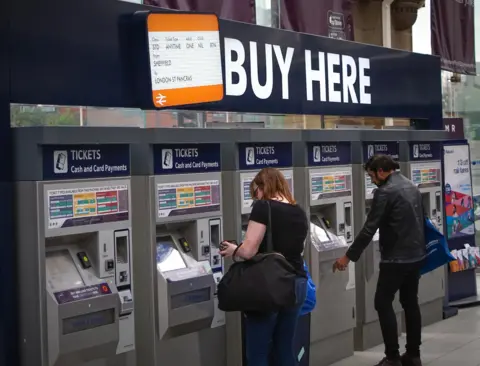Train penalty fare overhaul urged: ‘We were fined £50 each over £3 extra fare’

 Alexandra Petri
Alexandra PetriTrain ticket inspectors should treat deliberate fare dodgers differently to people who make genuine mistakes, the passenger watchdog has said.
Transport Focus said there was “an overwhelming need for reform” but the Rail Delivery Group, which represents train firms, said staff have discretion over individual circumstances.
Scores of people have contacted BBC News to say they felt ticket inspectors had been over-zealous in giving them penalty fares.
Alexandra Petri and her partner Ross Jones bought advance train tickets but ended up on the wrong train. When they tried to pay the difference in fares of £3 they each had to pay a penalty fare of £50.
‘It’s easy to buy the wrong ticket by mistake’
Transport Focus said it accepted the need for a penalty-fare system but called for more discretion to be used in the case of passengers who make an honest mistake.
“We accept that some cases are very clear cut,” said Mike Hewitson, the watchdog’s head of policy. “But there are grey areas, cases where perhaps more discretion should be used.”
Railway companies lose £240 million every year from ticketless travel – but there are certain cases where a passenger making a mistake with their fare doesn’t cost the train company money, he added.
 Getty Images
Getty Images“It’s about trying to strip out the mistake from the deliberate,” Mr Hewitson said.
“It can be easy to get it wrong… people should know what their ticket entitles them to, but the train operators also have to make this clear to them”.
Last year the then Conservative government announced a trial of scrapping return train tickets. It said there were 55 million fares available in Britain, which made it difficult for travellers to decide which is best for them.
This month a landmark ruling found as many as 74,000 prosecutions for alleged rail fare evasion in England and Wales were set to be quashed as a certain legal procedure should not have been used.
‘You’re fare dodging’
Following the BBC’s reporting of this story passengers who had not been prosecuted but had received penalty fares got in touch.
Many we spoke to said they had mistakenly believed they could buy tickets on board a train.
In the UK, you must have a valid ticket to travel on a train, unless no ticket purchasing facilities exist.
A penalty fare is charged if you do not comply with ticket purchasing rules and the maximum is £1,000.
The penalty is £100 plus the price of the full single fare applicable for your intended journey.
However, if it is paid within 21 days, the penalty is reduced to £50 plus the price of the single fare applicable.
A fine for rail ticket evasion can arise if the penalty fare is not paid and court proceedings follow.
Holly, 29, was among those who told the BBC she thought she could buy a ticket on board a train.
“I found the guard and said: ‘Can I buy a ticket, please?’ And he said: ‘No you can’t, you’re fare dodging.’ I was a bit shocked,” she said.
After Holly unsuccessfully tried to appeal her penalty fare, she was sent a magistrates court summons.
“Eventually, I got through to the train company’s phone line and paid £55,” she said.
‘You can’t explain yourself’
Rob McDowall, 41, told the BBC he also tried to buy a ticket on board when there were no working ticket machines at Leatherhead station in Surrey due to building works.
He decided to buy a ticket when he got off, two stops later at Epsom.
“The ticket inspector told me I was lying, as if I had refused to buy a ticket,” he said.
“He was very forceful – he prodded me in the chest twice.
“I reported it to BTP [British Transport Police] but nothing came of it.”
Rob received a court summons and pleaded guilty after receiving legal advice and was fined more than £300.
“The way the whole system is set up you basically can’t explain yourself,” Rob said.
A spokesperson for the Rail Delivery Group told the BBC: “Fare dodging is unfair because it means less money to invest in improving services and increases the burden on fare-paying passengers and taxpayers.
“We would always advise customers to purchase a ticket before they travel. All staff involved in the issuing of penalty fares have discretion over the individual circumstances of the customer.
“There is a robust statutory appeals process for every penalty issued, which includes an independent final appeal stage to consider wider circumstances.”
Related
Why investing in women is a vital next step for…
Get Nadine White's Race Report newsletter for a fresh perspective on the week's newsGet our free newsletter from The Independent's Race CorrespondentGet our fre
Business secretary signals major shift on electric car policy to…
In a determined effort to retain Nissan’s manufacturing presence in Britain, Business Secretary Jonathan Reynolds has vowed to implement “substantial c
Joint Statement: Business Secretary and Fujitsu Services Ltd
Business and Trade Secretary Jonathan Reynolds today (Friday 7 March) met chiefs for Fujitsu in Tokyo to begin talks over the cost of redress for victims of th
UK foreign secretary backs multilateral defence funding for Europe
UK foreign secretary David Lammy has said that a new multilateral fund will be needed to secure Europe’s defence as he confirmed that Britain is “open to”














